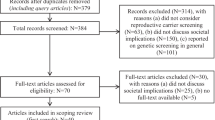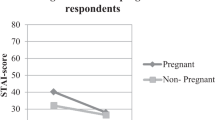Abstract
Expanded universal carrier screening (EUCS) entails a twofold expansion of long-standing (preconception) carrier screening programmes: it not only allows the simultaneous screening of a large list of diseases (‘expanded’), but also refers to a pan-ethnic screening offer (‘universal’). Advocates mention three main moral advantages of EUCS as compared with traditional (targeted and/or ancestry-based) forms of carrier screening: EUCS will (1) maximise opportunities for autonomous reproductive choice by informing prospective parents about a much wider array of reproductive risks; (2) provide equity of access to carrier testing services; (3) reduce the risk of stigmatisation. This empirical ethics study aims to widen this account and provide a balanced picture of the potential pros and cons of EUCS. Semi-structured interviews were conducted with 17 health (policy) professionals and representatives of patient organisations about their views on carrier screening including a possible EUCS scenario. Stakeholders acknowledged the potential benefits of EUCS, but also expressed five main moral concerns: (1) Does EUCS respond to an urgent problem or population need? (2) Is it possible to offer couples both understandable and sufficient information about EUCS? (3) How will societal views on ‘reproductive responsibility’ change as a result of EUCS? (4) Will EUCS lead to a lower level of care for high-risk populations? (5) Will EUCS reinforce disability-based stigmatisation? While having the potential to overcome some moral limits inherent in traditional carrier screening, EUCS comes with moral challenges of its own. More research is needed to (further) anticipate the ethical and practical consequences of EUCS.
Similar content being viewed by others
Log in or create a free account to read this content
Gain free access to this article, as well as selected content from this journal and more on nature.com
or
References
Lakeman P, Plass AMC, Henneman L, Bezemer PD, Cornel MC, Ten Kate LP : Preconceptional ancestry-based carrier couple screening for cystic fibrosis and haemoglobinopathies: what determines the intention to participate or not and actual participation? Eur J Hum Genet 2009; 17: 999–1009.
Nazareth SB, Lazarin GA, Goldberg JD : Changing trends for genetic carrier screening in the United States. Prenat Diag 2015; 35: 931–935.
Cousens NE, Gaff CL, Metcalfe SA et al: Carrier screening for Beta-thalassaemia: a review of international practice. Eur J Hum Gen 2010; 18: 1077–1083.
Kaback MM : Population-based genetic screening for reproductive counseling: the Tay Sachs disease model. Eur J Pediatr 2000; 159 (Suppl 3): S192–S195.
The American College of Obstetrics and Gynaecologists’ Committee on Genetics: ACOG Committee Opinion no. 486. Update on Carrier Screening for Cystic Fibrosis. Obstet Gynecol 2011; 117: 1028–1031.
De Wert G, Dondorp WJ, Knoppers BM : Preconception care and genetic risk: ethical issues. J Community Genet 2012; 3: 221–228.
Edwards JG, Feldman G, Goldberg J et al: Expanded carrier screening in reproductive medicine—points to consider. Obstet Gynecol 2015; 125: 653–662.
Lazarin GA, Hawthorne F, Collins NS, Platt EA, Evans EA, Haque IS : Systematic classification of disease severity for evaluation of expanded carrier screening panels. PLoS One 2014; 9: 1–16.
Grody WW, Thompson BH, Gregg AR et al: ACMG position statement on prenatal/preconception expanded carrier screening. Genet Med 2013; 15: 482–483.
Langlois S, Benn P, Wilkings-Haug L : Current controversies in prenatal diagnosis 4: pre-conception expanded carrier screening should replace all current prenatal screening for specific single gene disorders. Prenatal Diag 2015; 35: 23–28.
Borry P, Henneman L, Lakeman P, Ten Kate LP, Cornel MC, Howard HC : Preconception genetic carrier testing and the commercial offer directly-to- consumers. Hum Reprod 2011; 26: 972–977.
Cho D, McGowan ML, Metcalfe J, Sharp RR : Expanded carrier screening in reproductive healthcare: perspectives from genetics professionals. Hum Reprod 2013; 28: 1725–1730.
Human Genetics Commission. Increasing options, informing choice: a report on preconception genetic testing and screening. 2011. Available at http://f.hypotheses.org/wp-content/blogs.dir/257/files/2011/04/2011.HGC_.-Increasing-options-informing-choice-final2.pdf.
Lazarin GA, Haque IS : Expanded carrier screening: a review of early implementation and literature. Semin Perinatol 2016; 40: 29–34.
Henneman L, Borry P, Chokoshvili D et al: Responsible implementation of expanded carrier screening. Eur J Hum Gen 2016; 3: e1–e12.
Markel H : The stigma of disease: Implications of genetic screening. Am J Med 1992; 93: 209–215.
Lakeman P, Plass AM, Henneman L, Bezemer PD, Cornel MC, Ten Kate LP : Three-month follow-up of Western and non-Western participants in a study on preconceptional ancestry-based carrier couple screening for cystic fibrosis and hemoglobinopathies in the Netherlands. Genet Med 2008; 10: 820–830.
Gordon C, Walpole I, Zubrick SR, Bower C : Population screening for cystic fibrosis: knowledge and emotional consequences 18 months later. Am J Med Genet 2003; 120A: 199–208.
Axworthy D, Marteau TM, Brock DJH, Bobrow M : Psychological impact of population-based carrier testing for cystic fibrosis: 3-year follow-up. Lancet 1996; 347: 1443–1446.
Ioannou L, Massie J, Collins V, McClaren B, Delatycki MB : Population-based genetic screening for cystic fibrosis: attitudes and outcomes. Public Health Genomi 2010; 13: 449–456.
Bell CJ, Dinwiddie DL, Miller NA et al: Carrier testing for severe childhood recessive diseases by next-generation sequencing. Sci Transl Med 2011; 3: 65ra4.
Pope C, Ziebland S, Mays N : Qualitative research in health care. Analysing qualitative data. BMJ 2000; 320: 114–116.
Ropers HH : On the future of genetic risk assessment. J Community Genet 2012; 3: 229–236.
Elias S, Annas GJ : Generic consent for genetic screening. New Eng J Med 1994; 330: 1611–1613.
Dondorp WJ, Sikkema-Raddatz B, De Die-Smulders D, De Wert G : Arrays in postnatal and prenatal diagnosis: an exploration of the ethics of consent. Hum Mutat 2012; 33: 916–922.
Harper PS, Clarke AJ : Genetics Society and Clinical Practice. Oxford, UK: BIOS Scientific Publishers, 1997.
Ready K, Haque IS, Srinivasan BS, Marshall JR : Knowledge and attitudes regarding expanded genetic carrier screening among women’s healthcare providers. Fert Ster 2012; 97: 407–413.
McGowan ML, Cho D, Sharp RR : The changing landscape of carrier screening: expanding technology and options? Health Matrix 2013; 23: 15–33.
Acknowledgements
We thank the stakeholders for participating in this study, and Evelien Vos (EV) for conducting part of the stakeholder interviews. The study was funded by the Netherlands Organisation for Health Research and Development (ZonMw grant no. 209040001).
Author information
Authors and Affiliations
Corresponding author
Ethics declarations
Competing interests
KH and LH are affiliated to a University Hospital that offers expanded carrier screening. The remaining authors declare no conflict of interest.
Rights and permissions
About this article
Cite this article
van der Hout, S., Holtkamp, K., Henneman, L. et al. Advantages of expanded universal carrier screening: what is at stake?. Eur J Hum Genet 25, 17–21 (2017). https://doi.org/10.1038/ejhg.2016.125
Received:
Revised:
Accepted:
Published:
Issue date:
DOI: https://doi.org/10.1038/ejhg.2016.125
This article is cited by
-
Societal implications of expanded universal carrier screening: a scoping review
European Journal of Human Genetics (2023)
-
The more you do it, the easier it gets: using behaviour change theory to support health care professionals offering reproductive genetic carrier screening
European Journal of Human Genetics (2023)
-
Ethics in pre-ART genetics: a missed X-linked Menkes disease case
Journal of Assisted Reproduction and Genetics (2023)
-
Couples’ experiences with expanded carrier screening: evaluation of a university hospital screening offer
European Journal of Human Genetics (2021)
-
Preconception expanded carrier screening: a focus group study with relatives of mucopolysaccharidosis type III patients and the general population
Journal of Community Genetics (2021)



